
God of War: Ragnarök (PS4) - Review
by Paul Broussard , posted on 25 November 2022 / 10,185 Views2018’s God of War is a game that, four years later, I’m still somewhat conflicted about. On one hand, it was a significant step forward in character writing and storytelling for the series, which narratively felt like it had largely run its course even before Ascension, and carried some incredible presentation and artistic direction to boot. On the other, it felt like it sacrificed much of the series’ unique appeal to achieve that, with combat being treated as a secondary and maybe even tertiary concern to the game’s narrative ambitions. Now its sequel, Ragnarök, is here and attempts to retool some of the moment-to-moment gameplay while keeping its predecessor’s grander storytelling designs intact. How well does it deliver?
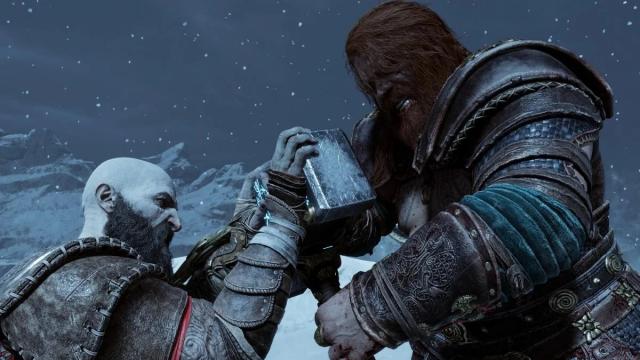
The story for Ragnarök picks up from the previous title’s cliffhanger. Several years after the conclusion of Dad of Boy I, Fimbulwinter has set in, and everyone is rightfully spooked about the incoming apocalypse of Ragnarök. It’s tough to provide any more details without delving into significant spoilers, but Kratos and Atreus wind up adventuring throughout the various realms of Norse mythology while struggling with their responsibilities towards others and their relationship with each other.
Nearly every aspect of Ragnarök seems designed predominantly to bring the story into focus, so let’s focus on how they do that before jumping into other aspects. For starters, God of War: Ragnarök looks gorgeous, and at the time of writing, may be the prettiest “realistic-looking” game I have ever played. The voice acting and direction remains exceptional, with Christopher Judge putting on another fantastic performance, but I’d honestly argue that even he is overshadowed by Ryan Hurst’s efforts as Thor. Other characters such as Odin, Atreus, Freya, and a few other, more spoilery individuals also boast incredible voice work.
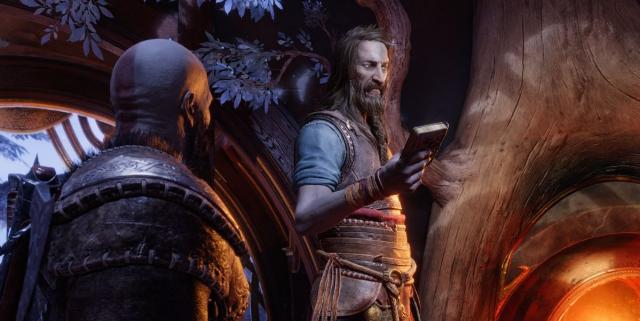
The presentation of Ragnarök remains impeccable in terms of camerawork as well. Framing a game as a single shot is an exceptionally difficult task, and like its predecessor, it’s often put to great effect when the camera dramatically swings from one character to the next in the middle of action cinematics. That said, I have to wonder if the team at Sony Santa Monica might be too dedicated to this philosophy. While I do think the game’s presentation benefits probably more than 95% of the time from this design choice, there are a few moments that I feel like could have been highlighted even more with cuts. But this is a minor nitpick, and even on the PS4 Ragnarök is an absolute visual treat, with superb environmental and character design.
Gameplay also contributes to building the story quite nicely. There are a few genuinely clever moments that really demonstrate a desire to merge gameplay and narrative, but they’re hampered by some inconsistent implementation. One example of this comes from a very early boss encounter where Ragnarök subverts its own fail state. The player is given a prompt to mash a button, but in reality it’s an unwinnable QTE that results in Kratos “dying” and the screen switching to the standard view that appears after a game over, before the boss declares the fight isn’t over and uses their powers to revive Kratos and keep the battle going. It’s a very effective idea, and other, more spoilery examples do a lot to blur the line between interactive and non-interactive components.
That said, some odd decisions to try and make certain story elements more interactive do feel a little silly. “Press F to pay respects” garnered widespread mockery, and rightfully so, but swipe right on the touchpad to prepare for a funeral isn’t much better, especially given the poignancy of the scene where it takes place. A few other elements also feel a tad misplaced; I can generally respect the desire to merge gameplay and story, but some moments just can’t be improved with player control.
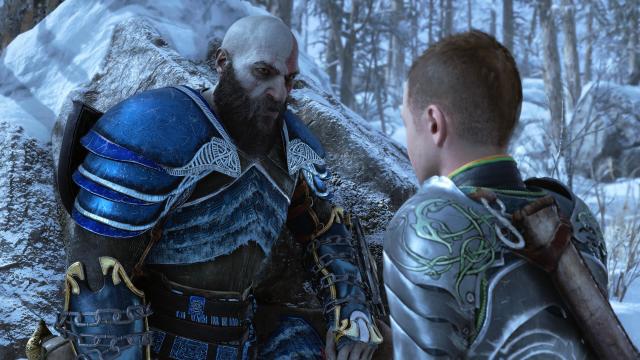
The narrative itself deserves special mention for being very potent. I might upset a few purists in saying this, but it does feel genuinely impressive how much of an arc they’ve been able to craft for Kratos. Even by the end of Dad of Boy I was a bit skeptical of the idea that Kratos had now become a family man who genuinely shows compassion for anything that is a mild inconvenience to him, but Ragnarök provides a genuinely believable and enjoyable conclusion to a character arc that really feels like it’s come full circle.
Atreus also really comes into his own as a character. His arc in the previous title felt rather dramatic and sudden, so it’s good to see him get a good chunk of screentime that really fleshes out his own motivations and separates him as his own person. The ending of God of War: Ragnarök and the presumed resolution to his character deserves special mention; I was surprised how much I had enjoyed Atreus by game’s end.
Combat is still at the center of the gameplay for these titles, though, and it deserves its own deep dive. The original was somewhat unfocused in this regard, with a number of its more experimental elements hampering moment-to-moment battles. To Santa Monica’s credit, a number of these have received some sort of fix. Enemies now dash horizontally far less, causing lock-on to break less frequently. Higher difficulties are now much more interesting and fun to play, as increased difficulty is accomplished in more interesting ways than just buffing enemy health to absurd degrees.
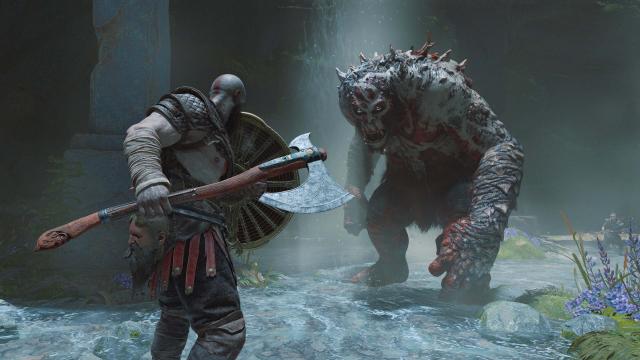
Unfortunately, many problems remain unaddressed. By far the biggest is the zoomed-in nature of the camera, which generates a host of problems and exacerbates others. Surveying the battlefield is a chore in its own right, and frequently results in the player being left uncertain where enemies are and when they will attack up until the very last second. The rather slapdash solution of placing yellow and red arrows for enemies/incoming attacks behind Kratos is both visually off-putting and rather imprecise, doing nothing to communicate what type of enemy or attack is approaching. The player’s ability to make plans and control space is significantly hampered as a result, which leaves encounters with multiple enemies feeling less like an experienced warrior skilfully dispatching his foes, and more like baby-sitting a group of unruly children, trying desperately to keep everything in front of you.
Compounding this is that both player and enemy attacks will often “magnetize” towards the nearest opponent and player character, respectively. Not only does this look ridiculous, but it introduces a heightened degree of inconsistency on both ends. For player attacks, it causes basic inputs in crowds to become unreliable, as Kratos may choose to attack an entirely separate opponent to the intended target due to no fault of the player. For enemy attacks, it makes careful positioning effectively impossible since you can never quite be sure if the game will cause the enemy to disco slide towards you or not. Again, more inconsistency, and a continued sense that the player is having to consistently account for the shortcomings and unpredictabilities of the combat system rather than pushing it to its fullest potential.
Other issues remain prevalent as well. Runic attacks continue to work on cooldowns, which encourages slow, defensive play rather than jumping into the fray. This, paired with the aforementioned camera issues, often makes falling back and playing cautiously the ideal strategy, especially when multiple opponents are around, which is unfortunate as the combat is at its best when Kratos is up close and personal. The RPG mechanics give a sense of progression, but come at the cost of consistency within combat, making attacks affect enemies in unpredictable ways. On Give Me No Mercy, leveling up the power of the Leviathan Axe once is the difference between a certain Level 3 enemy type having their attack animations armor through Kratos’ basic light attacks and being interrupted. These problems are less prevalent with small encounters or the wide selection of one-on-one boss fights, but for the majority of encounters it feels like Ragnarök's design is often at odds with itself, creating a combat system that is most enjoyable when the player is fairly aggressive but designing systems that seem to discourage it.
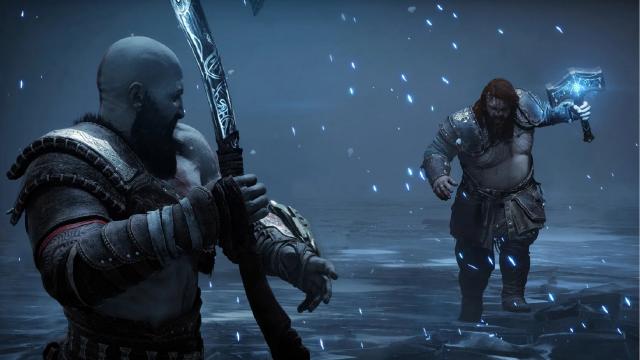
In-game dialogue also seems to reflect this idea of design choices conflicting with each other. Like its predecessor, Ragnarök has a sizable emphasis on environmental puzzles, but despite the inclusion of these challenges it rarely seems willing to trust the player to solve them. Take more than 15 or so seconds to solve a puzzle and a character will chime in to provide a significant hint, and in some cases flat out tell you the solution. Sometimes they won't even wait that long; on several instances I received a hint just as I entered the room or climbed the ledge where the puzzle was present. This extends to status effects too; characters will inform you that you are on fire or poisoned, despite the presence of obvious visual indicators. There’s no way to disable this sort of commentary, either, which makes the experience feel rather heavy-handed, as if the player is constantly being instructed on what to do, and it feels like a very curious inclusion to even have these observational elements if the player will not be trusted to even notice them, let alone address them. It's kind of a bizarre contrast between the gameplay ostensibly designed to make you feel like a God of War, but the much of the design philosophy treating the player like a hapless child.
Perhaps the initial response might be that none of this matters, as the new God of Wars are setting themselves up to be titles more about creating a certain experience rather than challenging the player to master a set of core mechanics, but I feel like that sells the idea of experiential titles short. Even very mechanically simplistic titles that are designed almost exclusively around atmosphere-building, like Spiritfarer and Return of the Obra Dinn, still trust the player to be able to identify basic environmental clues. One might argue that that trust is, in fact, what makes the experience for these titles; neither of them would likely be anywhere near as satisfying if the solutions were consistently handed to the player.
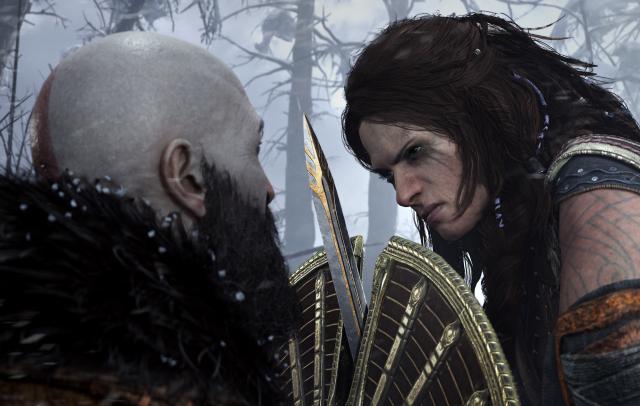
In summary, God of War: Ragnarök feels like a ride at an amusement park. Despite the openness of the world and the ability to branch out for side quests, it never feels like Santa Monica is quite willing to fully take its hands off the steering wheel and let the player drive. The end result is a title that feels like it wants to incorporate a variety of gameplay elements, but is unwilling to expand on them in meaningful ways. As a result, all we’re left with is an admittedly very well-told story and some crunchy combat animations. Perhaps that’s enough to carry the game for some, but this feels like settling for far too little; this is a series that had combat with a solid amount of depth yet still managed to tell stories that, at the time, were widely considered the height of video game storytelling. Ragnarök’s fantastic narrative and enjoyable characters ensure that it isn’t getting out of here without a recommendation, but its gameplay shortcomings mean that it ultimately falls short of some of its loftier ambitions.
VGChartz Verdict
7
Good
This review is based on a copy of God of War: Ragnarök for the PS4
More Articles
I agree. I'm not a fan. Of either of the 2 games. They are fine 7/10 games imo. Technically brilliant, look good, but I get bored and don't enjoy it much. Gameplay is not good imo. I even feel tired thinking about playing them again.
Haven't managed to play Ragnarök yet, but you do put into words things that (mildly) frustrated me when playing the original, but which I didn't really think about much at the time - the snappy 'disco gliding' to make contact in combat, the flashing indicators being a very game-y and not particularly effective way to compensate for a restrictive camera angle, and slightly excessive hand-holding. I'd also add somewhat disappointing enemy design variety (not sure if they address that in Ragnarök).
But I fell slightly more into that category of people you mention at the end who felt a great cast of characters, good story, excellent VA, and crunchy combat carried the game, and so I wasn't that bothered by the frankly average gameplay. Perhaps that's partly because I haven't played any of the original series, so I didn't bring that baggage of expectation into the reboot. I ended up giving it an 8/10.
I wholeheartedly disagree with pretty much every criticism here and that's totally fine. I loved every aspect of the game and give it a 10/10, so I'm very happy ?
Completely fair; if it's a 10/10 game for you, I'm glad you enjoyed it that much.
Thank you ? And to anyone who did enjoy the game please don't become embittered by this review, there's a multitude of reviews out there for this game and despite universal acclaim there's always going to be outliers who didn't resonate with it and that is their personal response, you can't dictate others opinions so don't be angry or upset, make peace with different perspectives, love what you love and stop seeking others to validate your opinion.
While I can follow your train of thought, which you communicate well, the core of this critique (which seems to be a pretty common one in VGC reviews) that "it never feels like [company name] is quite willing to fully take its hands off the steering wheel and let the player drive" just never gets anywhere with me. Not as someone known to enjoy even the occasional visual novel, which Ragnarok is assuredly nowhere near to being.
To me, it's perfectly acceptable for function to follow form in art, and just in general I found the two things here aligned very much to my satisfaction and engagement (to try and avoid spoilers). I found Ragnarok frankly an exponentially more immersive and creative game all-around than the majority of games I've played and can't help finding most of the critiques of the game play here to be just coming from a different mindset than mine that refuses to appreciate this game for what it actually sets out to do.
(Not to be childishly defensive of something I've invested my time and money in, but just to state the firmness with which I feel like Ragnarok, while not "perfect", whatever perfection even is, actually is kind of a masterpiece.)
It's certainly not defensive, and entirely reasonable to feel that way. If that sort of thing doesn't bother you (or if you view it as a positive outright), then I can definitely see how it wouldn't impact your enjoyment of the game. It's completely fine for someone to think a game is a masterpiece that I don't, and vice versa.
If you don't mind some back and forth, I'm not sure I'd agree necessarily with the assertion that the degree of "handholding," for lack of a better way of putting it, is a tertiary element that doesn't significantly impact what God of War sets out to accomplish. Let's take the puzzle element, if I may, as I think it's the easiest for me to express my feelings about.
If I can invoke an example across genres, the Arkham games have a rather simple overarching design philosophy that I feel is applicable in this context. At the risk of invoking a cliche, almost everything in the Arkham games is designed to try and make you "feel like Batman." One of the ways the game accomplishes this is its puzzles; Batman is ostensibly the world's greatest detective, so to make you feel like Batman, the game needs to actually force you to, well, use your head and solve some puzzles. The puzzles are rarely particularly taxing, but they for the most part do require you to be able to figure things out; identify the correct tool to use and where to use it (although admittedly there is a sizable amount of handholding at the start of the games while the player gets their feet under them). If the Arkham games consistently told you how to figure out everything, then it would significantly hamper that part of the "Batman experience": You would no longer be the "detective," instead, the game would be the one solving things, while you would simply be doing what you were told.
Personally, both old and new God of War titles strike me as titles designed to give the player a similar kind of an experience; to make the player "feel like the God of War." In the older games, Kratos is essentially a destructive force of nature, hell bent on revenge no matter the cost, and they accomplish this goal by having Kratos be a nigh unstoppable killing machine in gameplay. Conversely, the newer games show Kratos as a not quite as powerful but more mature and wiser, which is invoked by a combat system that is far more grounded and an emphasis on showing him using his wits to navigate the environment. The greater emphasis on handholding effectively harms that experience, however, because we are no longer that more vulnerable but wiser Kratos having to rely on our wits rather than our brute strength to survive. As a player, we're being robbed of the ability to feel that survivalist aspect of what the God of War is now, of having to be both smart and strong, and I do think that genuinely harms the experience that the game is trying to create.
Maybe that sounds a tad dramatic, and I certainly don't expect everyone to feel the same way, but I do want to at least try and communicate that I'm not trying to come into this insisting that the newer God of War games are titles with a gameplay philosophy that I refuse to appreciate. I think there's a lot of good here; but there's also a few crucial mistakes that undermine that philosophy, at least for me. Not everyone will feel the same way, and I fully respect those who don't, but it is a sticking point personally.
Thanks for the follow-up!
I can follow that argument and yeah there is a bit much "aid" the player is rendered in certain areas for my taste too, but look, I find that somebody will complain about the sort of aid that AI characters may provide no matter what and that the more common gripe is that allies are incompetent, useless burdens upon the player who annoy more than immerse. Personally, I'd much rather a title err in the direction of making me feel like these characters are convincingly real beings, as in possessing an IQ above 30, than the other way around.
The most recent Batman title I've played was Batman Returns for the Sega CD (so I'm current, right?), but to illustrate with a favorite game of my own, one of the critiques people sometimes have of Knights and Bikes is that your companion character, if controlled by the game's AI, defeats too many enemies on her own or might find and activate a hidden switch herself, thus essentially solving a puzzle for you, from time to time. I dunno, to me that just helps me feel like Nessa/Demelza (whoever I'm not playing as) is as competent as me and prize that sense of believability more than another "aha" moment because the relationship between these characters is the core theme of the game. While they're certainly very different games in many ways, I feel as though Ragnarok even more so is about the relationship between Kratos and Atreus and their relationships toward others more than other things.
More pointedly, I don't think you're acknowledging the observable fact that the developers HAVE taken to heart the critiques of their preceding God of War by franchise purists and sought to make this title a more interactive and directly involving experience, as to more fully honor the legacy of the series, but just in a way that doesn't quash the heightened character focus that defines this new generation of entries, but rather seeks to aid it where possible. I suppose it comes down though to which generational vision for the series one prefers overall. Each has its strengths and weaknesses, but I definitely see the generational shift in the franchise as an evolution, myself, and can't help feeling like most players, furthermore, will find a critique such as the OP to be on the nitpicky, hyper-critical side more than reflective of their own experience. I felt very immersed into Ragnarok's world pretty well throughout and didn't want to leave!
I do think I took into account the changes made by the devs to fix some of the issues that I and others had with the game's combat; I dedicated a paragraph in the review to the improvements made in that regard. Even though I would have liked more to be done, I am certainly grateful for what was made.
With regards to the AI of companions, I'd respond in two ways. First, I think this is a false dilemma; characters can still interact and be believable without needing to fully give away the answers to puzzles or effectively backseat you during boss fights. I'd argue that both Dad of Boy and Ragnarok are themselves examples of this; when I think back on those games, the examples that really make these characters memorable for me aren't when they chimed in to tell me how to solve a puzzle, but when they engaged in friendly banter or made an amusing point (special mention to that fantastic PSABR reference). I think you realistically could have replaced every hint given with an offhand comment about trying to figure out what to do and it wouldn't have made them feel any less real.
Second, though, and maybe more importantly, I'd argue that the handholdy nature of the characters sometimes actively hurts the ability to make them feel real. Perhaps it's realistic to expect someone like Freya to be able to instantly solve a puzzle or determine how to defeat an enemy, but certainly not Atreus and probably not Mimir for combat elements. The fact that a teenager can diagnose how to navigate an environmental puzzle almost immediately (and faster than his father who has countless years of experience at that very thing) is probably unreasonablec. If anything, I'd argue the game's heavyhandedness makes its friendly NPCs feel less like actual people and more just like a vessel for the game to tutorialize.
Maybe most people will feel that is just hyper critical, but for whatever it's worth, I've seen quite a few people echo similar frustrations with the game's tendency to handhold on social media. Admittedly this is all ancedotal and perhaps my social circle is just composed of snobs, but I do think there is at least a non-insignificant number of people who have expressed some degree of frustration with the design choices here.
You know what, fair points all actually! Especially when you highlight the merits of clearly distinguishing between the puzzle-solving capacities of a character like Freya and someone like Atreus. That does make sense.
But still though, the next question becomes: do issues like that really bring Ragnarok down to a 70% score? shrugs Nah, not in my book anyway. Not even close. The fact that I scarcely noticed the sort of problems you're highlighting here in my playthrough illustrates their seriousness to me. In particular, I've really grown attached to the more personal, visceral feel that the zoomed-in camera creates. It JUST feels right for this franchise; like a complete match for its soul! And I'm glad the developers have made the effort here to correct for some of the game play shortcomings that led to that players complained about in the previous game (like the cheap lock-on breaks you mentioned in the OP).
And I think it's totally reasonable to feel that way. I'd agree with what I think your general sentiment here is, that a significant part about how good a game seems to you is not just how many flaws it has, but how much those flaws matter to you. Metroid Dread is one of my favorite titles in the past few years, but I could probably write an article as long as this review detailing all the game's shortcomings (in my opinion). The only reason I scored it as high as I did is that its shortcomings don't bother me as much, but I've run into quite a few people who do believe those shortcomings matter a lot and would likely give it a lower score if they were to review it themselves. If my critiques for Ragnarok don't personally bother you, or if you don't consider them flaws at all, then I can certainly see why you would feel it deserves a higher score, but I think I would be dishonest in detailing my personal assessment of the game by not stating that they did impact my enjoyment of the experience a fair bit. Not enough to stop it from being a good game, but enough to hold it back from greatness, at least in my opinion.
If I can soapbox for a second, I think this serves as a good illustration why I believe the content of the review should get more attention than the score, and part of why I'm kind of against scoring games numerically in the first place. A score, at the end of the day, is just a clumsy way of trying to distill all of my thoughts on the game's mechanics, story, atmosphere, and more into a single digit. If you don't come into the review with the exact same perspective as the reviewer, the number is often rather useless. But the individual content, can, at least provide some context and inform the reader on whether the flaws the writer points out will be a big deal to them at all. Not to imply you didn't read it or fall into this category; you obviously took the time to read through things and I am thankful for that, but scores are just a really shallow way to try and convey a complex opinion on games and it's a shame they get so much more attention. The idea that "X game is better than Y because it got a marginally higher score" is a heavily oversimplified and often inaccurate one, especially when different authors and/or genres of games are involved.
As a forewarning, this comment really has nothing to do with the game at hand per se and is entirely directed towards the other topic you raised. Sorry to veer this exchange to a different subject. But I have opinions on it!
Part of me kind of agrees with you on the merits of doing away with numerical scoring of games. Believe it or not, you and Lee are actually kind of my favorite reviewers around here, which is why I more often choose to respond to the reviews you post. I don't really care if someone agrees with me about everything or not is the thing there; I'm mostly interested in the reasoning and find there's often something of interest in your reviews to consider.
Anyway, I can see how the two of you in particular, more than other reviewers on this site, would benefit from there not being a scoring system. I think the score is the first thing people instinctively look at when they read a review and the fact that the two of you have a pattern of often scoring games 20% or more below their average on Metacritic or Open Critic FEELS provocative, like it's aimed at getting attention. And if that's the aim, it often succeeds, as we can readily see by the 438 shares this article has quickly amassed (which is quite high by VGC standards) and the fact that nearly 1 out of every 10 views has resulted in a share (an extremely high share ratio). The bulk of the attention these reviews get though often seems to be negative, at least here on the site (as most of us commenters seem to disagree with the opinion offered, you'll notice). Without a scoring system though, none of that would be true. These reviews would definitely become less visible outside of this site, and also would likely be better received more often because people would be responding to the thoughts on offer instead of the frequently unpopular score.
However, reality is that, speaking for myself, if nobody scored games, my life as a consumer would feel exponentially more painful as a result. That's because my system of deciding whether to use my finite resources on a purchase of this or that game works sort of like this:
1) I look at the early trailer and/or written summary provided by the developers to decide if it looks/sounds interesting or fun to me.
2) When the reviews come out, I look at the average review score and, if it's 80% or above, I buy it. If it's below 70%, I probably decide against a purchase. Only if it's in that 70-79% range do I generally take the time to really read a set of reviews in advance of buying. I more often read reviews after playing through the game to add to my perspective, like I did with this one. In buying decisions, I also take into account what seems like the general presence of a roughly 5 to 10% indie tax in Metacritic's average review scores.
3) I may also consider any game's average review score after launch (especially if it's an indie game) as the basis for further investigation.
I don't trust the opinion of just any one person when it comes to game reviews very often, so without score aggregators, I would feel obliged to read through countless reviews before making a simple "buy or pass" decision and that would be unreasonably burdensome on my finite volume of time and energy one day in advance of launch, so I'd prolly just decide on a site I trusted the most, which would likely have the long-term effect of me missing out on lots of games I'd otherwise have gotten. So I mean, unfortunately, I think that, for all their faults, numerical scoring has a place in our world. ALTHOUGH it needn't have one on any one particular site (as VGC), as a caveat worth adding!
(As an aside, review scores are also sometimes useful to me as points of comparison. Like for example, I can look at how you scored this game in comparison to how you scored a game I didn't enjoy as much like Horizon Forbidden West as one shorthand way of evaluating the extent to which our "value systems" align vis-a-vis this medium.)
All very reasonable and rationale points: perhaps it would have been more realistic of me to say that I wish we didn't have to live in a world with scores. As you note, though, they are much easier to use to get a broad sense of how a game is viewed, and the traffic point certainly hits home since that's a big part of why they were brought back here.
so, it's almost as good as scorn.... nice
Humanity is simply not ready for this truth.
LATE EDIT: Also, Scorn is scored lower, so you have it backwards.
it's about the same... half a point difference
Erm... okay. But now I'm left wondering if you're only teasing with the comparison or being unironically cheeky & critical.
it's unironically cheeky & critical sir, the gameplay is flawless in god of war, the story is amazing, the graphics is on another level, and yet, those small nitpicks in the review warrant the deduction of 3 points.... while scorn, a bare minimum of what you call a video game, absolutely terrible, it was made just to shock, and even failed to do that, and yet, they got almost the same score.... I still respect that everyone has his opinion, but now, I don't think I trust vgchartz for the reviews like I used to.
Alright. Well then, I guess I should respond more seriously. I mean... do you not understand the conditions with which both games are being evaluated? You're talking about two disparate titles with different value propositions, design goals, etc., which is why I figured you were just being flippant and unserious at first. By this rationale, would you not trust any game site that scored something like flower or Journey higher than one of Ubisoft's more polished titles?
-"and yet, those small nitpicks in the review warrant the deduction of 3 points.... "
YOU may not agree with these critiques, but you're falsely personifying what's been stated. This isn't a simple "gfx weren't tightened on level 3 therefore 7/10." Several issues stated go back to action-game fundamentals.
-"while scorn, a bare minimum of what you call a video game, absolutely terrible..."
I'm less concerned about whether you enjoyed it or not (it's a love or hate game), but I'm not following the barely a game portion. Each area has puzzles to solve and enemies to handle. I guess I would revert back to a previous question: do you reflexively disregard any site that'll elevate some mechanically slim titles (prominent walking sims, platformers, etc.) over decently-polished Ubisoft titles or Soulslikes?
Sorry but if reviews aren't hold at the same standard them they are pointless. Even more when you go for what the game tried to achieve and "discount points" for what it didn't achieve (even if in fact it did achieve).
-"Sorry but if reviews aren't hold at the same standard them they are pointless."
That's a bad-faith interpretation of what I'm getting at.
And what is the right interpretation of what you said? Because for me you were pretty direct that the standard changes based on anything someone wants in a way that the same score for Scorn, Journey and GoW:R doesn't mean anything at all because they tried to achieve different things.
I'm kinda confused by your phrasing, but I'll try to work with it. There's still a methodology being adhered to, but that's naturally going to be approached differently based on what the game is/isn't trying to accomplish. For example, I'd say you're being unfair if you slam a strategy game for its on-foot battalion clashes not having the same detailed animations as Ragnarok. You implicitly understand the silly whacks when two parties clash is meant to be basic, since your attention ought to be directed towards the wider battlefield. It's more of an abstraction than meant to vividly convey everything on the battlefield. It's also insanely unrealistic to expect any strategy game to pour so many resources into something many won't even notice.
Do you follow this throughline here? Because you seem to be sloppily mashing together two things: "challenging a game's own implicit goals within the wider context of its competition" & "what are standards? lol." I'll rephrase a previous question for you: do you reflexively disregard any site if they graded Journey higher than one of the more polished Ubisoft titles? After all, something like Far Cry 6 (which seemed relatively polished at launch) has 50+ hours of content, a wide open world, hours upon hours of voice acting by professional talent, etc. etc.
Yes, for sure I wouldn't expect the same level of animation on a 1000 people clash from far away (but sure if talking on same gen for cinematics I would expect similar level of quality).
I don't disregard any given site for giving one specific game a lower score than another one (although I do have my gripes when looking at the same site different reviews and being clear that the bar for the review is quite different between Journey, Bayo, FC and GoW let's say). But when a site is consistently under meta for some company/type of game and over meta for some other then I challenge their standard.
I saw one of the comments of the reviewer for GoT if I'm not wrong he saying that he had even more complains about Metroid but for some reason it didn't bother him as much so he gave higher score.
Someone raised this scores from the reviewer
Death Stranding 4/10
Ghost of Tsushima 5/10
TLOU 7/10
GoW:R 7/10
Now Scorn 6.5.....
You're mixing up reviewers a bit, although though both have an average score of 5.6/10. Here are their scores for various big-name releases from the last few years:
Paul/MTZ:
God of War Ragnarök - 7/10
Bayonetta 3 - 7.5/10
Saints Row - 4/10
Elden Ring - 8.5/10
Horizon Forbidden West - 7.5/10
Pokemon Brilliant Diamond/Shining Pearl - 2.5/10
Metroid Dread - 9/10
Deathloop - 7/10
Ghost of Tsushima Director's Cut - 7/10
Ghost of Tsushima - 5/10
Returnal - 6.5/10
Lee/coolbeans:
(Scorn - 6.5/10)
The Last of Us Part I - 8/10
Grounded - 6.5/10
Gran Turismo 7 - 8/10
Dying Light 2 Stay Human - 6/10
Halo Infinite - 8/10
Call of Duty: Vanguard - 4/10
It Takes Two - 9.5/10
Marvel's Spider-Man: Miles Morales - 7.5/10
The Last of Us Part II - 7/10
Death Stranding - 4/10
Gears 5 - 7/10
Thanks for giving more data.
-" (but sure if talking on same gen for cinematics I would expect similar level of quality)."
I mean... even there you and I are going to disagree about universal expectations. Given that the only strategy studio that'd come to GOW's cinematics is Blizzard, I think it'd be absurd to carry that expectation across other devs in the genre.
-"I don't disregard any given site for giving one specific game a lower score than another one"
Alright, fine. Then let's broaden the expanse of my initial question: would you reflexively disregard a gaming site that graded numerous Journey-level indies higher than a lineup of fairly-polished AAA Ubisoft titles? After all, the average content amount for them is 50+ hours, they're open worlds with things to collect, etc. etc. At some point, I think you'll be inclined to agree that the daring or off-beat concepts might have something (let's say "an x factor") that speaks to you compared to polished but not exactly nourishing content. Maybe the next Far Cry doesn't reach its implicit design goals by being a story-heavy, open-world shooter with a vapid narrative and some contradictory mechanics. Even if it's still polished and content-filled, I wouldn't be surprised if it received somewhat underwhelming reviews. If those are explained well, I don't see the problem with higher consistent grades to the indies.
-"(although I do have my gripes when looking at the same site different reviews and being clear that the bar for the review is quite different between Journey, Bayo, FC and GoW let's say)"
1.) I'm not really sure what Bayo 3 and GOW are doing here. The bar is still them being action games but at different ends of the spectrum: Bayo wins out in the gameplay department, GOW in the narrative. I'm just going by Paul's words here, but that seems pretty clear imo.
2.) I mean, I guess I have to wait on your response to my reiterated question above, but I still think you're muddying up "responding to a game's own goals" with "standards go out the window lol." That's just how I read it.
-"GoT if I'm not wrong he saying that he had even more complains about Metroid but for some reason it didn't bother him as much so he gave higher score."
I guess I'll leave that for Paul to clarify (if he wants), but I guess this is where someone separates between 'nitpicks' and critical frustrations to one's enjoyment of a game. It reads to me like a usual value judgment one might have about x or y flaw.
-"Someone raised this scores from the reviewer"
Like Machina said, some of those are mine. I can't personally speak to Tsushima 1.0 nor Ragnarök.
I don't put the expectations specifically in a genre or studio, but on contemporary content. I do like cinematics and think they are important, but can accept a game not having one (more than they making a poor one). But that is besides the point as cinematics is just one aspect. I was more on the overall production being hold to same standard. Instead of "well this is a switch game so we can't expect performance or graphics so let's use a different standard to judge", "this is an indie title so they won't have budget to do VA, etc".
I certainly won't expect neither of those on those titles, but we shouldn't just ignore it and end up with let's say 3 games with same 80 score but meaning completely different stuff. Even more when going for GOTY, on there it really should be the absolute best game of the year, that have outshined competitors in all aspects (or at least most aspects while not being lousy in any).
About your expanded question, yes I wouldn't give credibility for a reviewing site that consistently give better scores (way above meta) to indie level titles (sure some are great, but not that many) and worse score (was below meta) to AAA titles that are achieving on all the aspects of it. I can certainly accept and value criticism of "it kept the same formula of the past game", "it doesn't differentiate from other current titles", etc, but that technically isn't something that should take so many points of a title. I certainly wouldn't give GOTY to CoD, nor I like FPS titles in general, but to deny some entries absolutely meets all the points necessary is ludicrous.
1) gameplay of GoW:R is absolutely fantastic, tight and precise so I'm not sure where it lose in this.
2) What you want me to clarify on this? Because frequently we do see reviewers taking out points of game not because it didn't achieve what the game intended or proposed to do but because it isn't what the reviewer wanted the game to do.
I saw Paul justification, but he said he had a lot more things to complain about Metroid than GoT while giving 9 to one and 5 to the other. Where in the world is Ghost of Tsushima a 5 game?
"I saw Paul justification, but he said he had a lot more things to complain about Metroid than GoT while giving 9 to one and 5 to the other"
This is not what I said. What I said was:
"...a significant part about how good a game seems to you is not just how many flaws it has, but how much those flaws matter to you. Metroid Dread is one of my favorite titles in the past few years, but I could probably write an article as long as this review detailing all the game's shortcomings (in my opinion)."
Not only did I not compare Dread to Ragnarok (or Ghost of Tsushima, which I haven't even mentioned on this page until now) at any point during my conversation with Jaicee, I never once mentioned how many "flaws" I believe those games have relative to each other. If I wanted to write an exhaustive list of my problems with each game, it is likely that the lists for the latter two titles would be longer. That full list would never make it into a review, however, because the review would become stupidly long and well past the point that anyone would reasonably be willing to read.
The original point of my comment was not to compare titles or even really communicate which games I like better, but rather to point out that not all problems impact your enjoyment of games equally It's possible to have a bunch of tiny frustrations with a title that don't really affect your enjoyment of it all that much, whereas another title might only have one or two problems that are so big they destroy your enjoyment entirely.
"gameplay of GoW:R is absolutely fantastic, tight and precise so I'm not sure where it lose in this."
While you're certainly welcome to your opinion, I would personally disagree on this point. Ragnarok's gameplay is marred by a number of problems that carry over from its predecessor, including a camera system that struggles to keep enemies on screen and convey relevant information in combat, inconsistent spacing on player and enemy attacks that introduces unnecessary guesswork and frustrates combat at times, unwanted handholding and overbearing guiding in and out of combat, and more.
There are some arguments to be made about whether incurring these problems is a worthwhile sacrifice; i.e. the camera obscures combat more but also works much better as a storytelling device by bringing us closer to Kratos. For some, that will be enough to outweigh the problems with combat. For me, it isn't.
"Where in the world is Ghost of Tsushima a 5 game?"
You're welcome to DM me if you would like an explanation for why/how I've scored games other than Ragnarok on here (or just read the review), but I don't intend to turn this comments section into a panel on the quality of other games because that always results in a pointless competition for why one person's favorite game is better than another.
-"I was more on the overall production being hold to same standard. Instead of "well this is a switch game so we can't expect performance or graphics so let's use a different standard to judge", "this is an indie title so they won't have budget to do VA, etc"."
Gotcha. For starters, I'm certain we can all kinda follow that with respect to performance. Even if some ppl have different tolerance thresholds, something's eventually gotta give with an inconsistent framerate. I'm not quite following the indie title comparison because most prominent ones can afford it - I'd argue some of them fare better than AAA titles too.
-"I certainly won't expect neither of those on those titles, but we shouldn't just ignore it and end up with let's say 3 games with same 80 score but meaning completely different stuff."
But why not? Because whatever 3 random games you're thinking of may have arrived with entirely different goals in mind. I can make an argument for some of my own stuff. I'll take whatever arrows come my way in praising What Remains of Edith Finch way more than Dying Light 2. Obviously the score disparity wouldn't be AS wide if DL2's online wasn't wonky, but regardless Edith Finch wholly captured my attention by being one of the most interesting stories of recent memory and its inventive ways of incorporating them through gameplay. I may have spent way more time in DL2, but it doesn't hit me to the same degree.
-"About your expanded question, yes I wouldn't give credibility for a reviewing site that consistently give better scores (way above meta) to indie level titles (sure some are great, but not that many) and worse score (was below meta) to AAA titles that are achieving on all the aspects of it."
Hold on now! I have to nitpick how you're phrasing the indie portion. I said "Journey-like indies" but you're muddying up the comparison by saying not many are good. But the assumption in my hypothetical assumes that all games (indie or Ubisoft) are at least "good." But I don't think that changes your answer much.
And I appreciate that answer too b/c I can safely say I shouldn't be a go-to source for you. I've been in a similar position as you, a heightened fixation on... let's call it all-aroundedness and put more weight into content (# of hours and whatnot). Sometimes I only had time & $$$ to spare for 2 games during a season. I get that. Today though, I can't help but lean way more towards experiences and challenging a game by its own implicit goals. I think we meet at an impasse there.
Seems like MTZ's answering the final 1.) and 2.) parts, so I'll just leave it at that.
I do know that I don't care much about 60fps, I have played and still play most in 30fps and as long as it is stable I don't see a problem on the game (but I do know some people think that 60 and 120fps are the most important aspect of a game and I accept that). On fps sure I would expect almost all Indies to be stable since they usually shouldn't push the HW to the limit to the point of fps drops.
On the 3 random games. I guess I'll have to reiterate, using your own example I wouldn't mind WREF being scored higher than DL2 if both are held to the same standard, my issue is when different games have same score because they were held to different ones, so a game with very strict review getting the 80 would be in fact much better than the one that got lenient reviews and that in itself doesn't help customers making a decision.
On the note about the Journey-like, ok you are saying the very best Indies (I don't regard them as high as some folks on vgc, but yes I do know some titles are really held high) then sure if you are using similar standard for both and arrived at better scores for the indies than the Ubies I have no issue. On the site "bias" we were talking, I'm fine with sites having it as let's say if you like one type of game or another the bias can help you if you chose a site that is focused on that (although I would say it isn't an objective review, and for me that is important, but I do know a lot of people like/accept subjective scores). The biggest problem is being part of the meta for the game. If we aren't making a meta using objective reviews with standards then the meta itself becomes a problem.
On your comment on being the source you are probably right, and it is one complain I have given to several reviews (not yours specifically), when a person that doesn't like the genre or type of game do the review and we can see the score being so much out of the meta. If you can't be objective on the review and separate your taste from it then it is better to have someone else do it (although I have seem people defending that "why shouldn't someone that hates racing review a racer? What about people that doesn't like racers that want to know if they should buy that game?" for me that doesn't make much sense =p).
-"...my issue is when different games have same score because they were held to different ones, so a game with very strict review getting the 80 would be in fact much better than the one that got lenient reviews and that in itself doesn't help customers making a decision."
I think we're going to have this perpetual hang-up about disparate standards, but I'm going to push through anyways. I can understand the question mark above your head about being lenient or strict for different games. But have you considered that certain flaws may affect a reviewer differently altogether?
I'll set myself as an example with the... 'pompous critic lens' I've been talking about: The Last of Us Part II. When I look at Part II's implicit goals (AAA narrative-driven stealth-action adventure), I have a BIG issue with the narrative-driven aspect. As I've brought up before, I think this is Druckmann's worst work yet. I can still respect some key storytelling components, but he jumped headlong into a terrible plan. The disjointed pacing, weaker side characters, etc etc.
It's funny how you brought up "strict" because someone in Part II's comments section suggested it wasn't fair to compare it to all-time greats in film or books. Which confused me because I literally linked my thoughts to The Last of Us (Part I). I literally had the original to fall back on in expressing how immature (dare I say artless?) some of Part II's elements felt by comparison. Because of those frustrations (along with some other issues), I believe Part II only earns a general thumbs-up. I'm still 100% behind my score.
Now jump to Scorn. I think it fell just shy of meeting its implicit goals (middle-market puzzler, occasional action, gore-fest adventure). It's already in weirder, cooler territory for me because it's basically the closest any game has gotten to capturing Giger (and others) and it's an uncaring place that demands you (the player) solve everything yourself (no chatterbox companion nor flashing UI icon). Its main weakness, combat, annoys me in a few ways. And so, I think landing at a 'qualified thumbs-up for genre fans' works for it.
-"The biggest problem is being part of the meta for the game. If we aren't making a meta using objective reviews with standards then the meta itself becomes a problem."
I'm kinda confused by this part, but I can follow the rest of the paragraph. I guess the main thing I'd pushback here is the inclusion of "objective" for me. It has some utility, but oftentimes poisons discourse imo. Similar to when you've brought up "all-around" and the consensus of MetaCritic, I just don't like to operate like that compared to respecting what a game's trying to accomplish and whether or not it succeeds. I think Roger Ebert's comparison to someone's "day in court" maps on pretty well for me.
Anyways, those are the most important points I wanted to grapple with. Hopefully, that was helpful and chime in with what you think.
Yes I can accept that different flaws affect different people in a different way (even more when being subjective), as I said I don't care much about 60fps and 30fps is very much enjoyable for me, even some fps drops and stuttering don't bother me much (but I do know that some people find that completely disturbing).
I liked the story of TLOU2, and without you putting what you didn't like we can discuss it, but sure I can see why some would prefer the timeline being straight (for me it would lose a lot of weight, but ok).
I think it is fine to compare it to great movies and books (and for the most part game stories are inferior to those, but with the improvement on being interactive), it wouldn't make sense to take points of it for coming short against the greatest movies /books since as a game for score it must be compared to other games =p and well Part 2 is truly divisive and some people really hated it (imho for the wrong reasons, but well personal taste are fine).
Looking your comparison of TLOU2 and Scorn is where we both totally disagree (like you set the bar at different heights for both making it easier for the second to reach it), but as you said we won't agree on it, but still I can certainly respect that you have your way of doing it (even if I disagree with it) since you aren't trolling, just going more subjective than objective (I'm very much "maths" oriented, I know the name in portuguese but forgot the one in english and want to avoid words that could be considered offensive).
The convo with you have been quite good =p so don't worry, I do believe you have understood and answered my points. And no problem you having different approaches. Again it is also fine to be different than the meta, but you can understand the concern on any given site or reviewer being always very very far from average, let's say for a meta of 95 he gives 5 or less and for a 65 meta he gives 95 (consistently). For me he may have valid points based on his taste, but it doesn't make sense to add to the meta.
LOL!
A 7? ok.
I already have an online buddy egging me on to do a sprint through this GOW duology. I didn't make it very far in 2018 before, and been meaning to give it another fair shot, but I'm just... not sure if it'll click for me. I understand wanting to move away from the familiar template with Greek GOW, but Norse's cinematic affectations and restrictive camera create more problems than they solve in an action game. I'm still tempted to experience the story for myself though, so it's doing something right.
I'm curious if there are any Greek GOW experts who actually prefer the modern over-the-shoulder fighting system over the old DMC template. I don't see the same fervor for it as I do for its story and characters.
I'm definitely no Greek GoW "expert", but I am someone who really likes hack and slash combat who still found myself enjoying 2018's combat more than the originals. The originals feel a little bit a hack and slash lite without an excessive amount of moves and combos which is on one hand nice since it's easier to get an overview of them, but it also means that things can often devolve into spamming the same 2 or 3 combos, at least in regular encounters which are rarely that tough. Having multiple weapons does help though and I'm certainly not saying the games are boring, just not always the most stimulating in my opinion.
In GoW 2018 the combat feels a lot more deliberate while still being fast-paced and smooth and while you might no longer be pulling off flashy combos in quite the same way, there's still a lot of elements (axe throws, Atreus attacks, Runic Attacks) that can be strung together and which add depth and variety. I never found myself bored playing it and the game also poses a lot more challenge to those willing to turn up the difficulty and/or do the optional content.
I think if you go into 2018 expecting the old games then yea, there's some boxes it doesn't check since it's no longer a pure Action game like them where you fight off hordes of enemies, but viewed instead as the Action Adventure it is, it has deeper, more satisfying and refined combat than most and an excellent story on top.
I think "deliberate" is an interesting way of putting it. I can at least follow that mindset of seeing it closer to a broader Action/Adventure versus the DMC template of yore. That's kinda the mindset I had with Hellblade. But what still gets me with both is when they still try to tap into their heavier action sensibilities. Norse GOW still wants to throw you in combat arenas with multiple melee, ranged, or mix of both enemies, and the fundamental tweaks needed to accommodate that are... not ideal imo. Maybe more time with it will soothe or exacerbate my concerns.
Although this is years out, I do wonder how fans would respond if GOW hypothetically goes to Egypt with a different action template. Would they be annoyed at not having horizontal traffic cone 'danger indicators' and zoomed-in camera? Remains to be seen, I guess.
bullshit.....boooooo!!!!!
People can have an opinion Sony fans doesnt always have to agree with you sorry.
I've read articles that claimed that this is the best game of all-time. Seriously!
Some do, and those authors are perfectly valid in doing so if they genuinely feel that way. Mine or any anyone else's feelings on a game don't discredit another person's opinion.
Crappy review
Haven't finished the game and I think this deserves to be goty!
A technological achievement from Santa Monica Studio!
I spent 120+ hours on elden ring an 50+ hours on gow and for me gow is just more enticing!
Elden ring is massive but u get bloated from it,
It's too big for its own good while gow doesn't overstay it's welcome and stays fresh as u press on
'Crappy review [because I disagree with the score]' = childish.
I agree Elden Ring is bloated (mostly because of copy/pasting of slightly modified bosses/dungeons and environmental features/tasks). It's one of the main reasons I think Dark Souls III is FromSoft's better game.
It was easy to see where this was going to end up. how many VGChartz reviews have we had now where the score is no where near the general consensus and we end up having this battle now we can use subjectivity to explain this but when you see a pattern of certain acclaimed 9/10 games getting low scores then its concerning not because they aren't high but because they are far outside the norm that has been built over time where in a ten scale 7/10 represents a pass and the range tends to sit at around - or + 1 of the median score.
Now I have seen reviewers state that VGChartz uses its own methodology when it come to scoring now that's well and good except you are reviewing for an audience and that audience for better or worse has grown accustomed to and uses the standard scoring methodology and so expects the scoring to adhere to that standard .
I have to push back against this one. Although I can understand not wanting to 'betray' an audience, I'm of the opinion that you ought to meet someone halfway. What does that specifically mean? You both internalize a reviewer's methodology and written words. If you're willing to do that and then challenge their points, it's totally fair game. But to invoke what the general populace perceives shouldn't really dictate what we do here.
Also, I don't think it's entirely accurate to say 7/10 reflexively means a pass. I've worked at a couple sites that follow a similar rubric to here (DarkStation, TechRaptor). Even some bygone outlets follow a similar template; EDGE Magazine is another example of using the 1-10 scale where 5/10 just means average/mediocre.
There are always exceptions to everything but for good or bad it became the norm , I'm not sure what you mean by betraying an audience or meeting them halfway, my comment was to do with methodology not meeting the general expectations of the consumer, after all there is a reason we use standards and truth be told I would rather that VGChartz gave no score and people make up there own mind based on the written work than continue to have this clash of mindsets.
-"I'm not sure what you mean by betraying an audience..."
That's just the word I interpreted when you brought up this clash between consumer and site's mindsets. Sorry if that comes off too strong from what you intended.
-"my comment was to do with methodology not meeting the general expectations of the consumer"
Right, but what I mean in meeting someone halfway speaks to that: I disagree with a site having to make this score appeal just because of its commonality elsewhere. So long as the methodology is clearly-stated and readily available, then you kinda have to understand house rules. There's onus on a critic to be forthright with their thoughts (in text and score) and there's onus on readers to read the text and internalize what said score means. If that doesn't jive? Well... that's what the plurality of review sites & YouTubers are there for.
Plus, if other outlets can remain stalwart on it, I (personally) don't see a compelling reason to change. It's kinda nice to occasionally go against the grain versus the high-score churn-out that got us here to begin with.
I'm not particularly interested in the Elden Ring vs. GoW debate, as they're two very different games that try to achieve very different things, and most of the arguments I've seen surrounding the topic seem to be more about trying to claim some arbitrary title of "best game" rather than genuinely discussing and critiquing the games themselves. That said, if there's something specific you think is faulty about this review, or a criticism I've made is questionable (without comparing it to Elden Ring or another game in an entirely different genre), I'm happy to respond/answer it.
I have nothing bad to say about your review, I would probably just say the negatives you present are more personal than anything else. Meaning if people feel those were natives then they would agree and if not then your review would not be relevant to them. For myself, none of your negatives I feel are negatives especially after beating the game. I would not give GOWR anything lower than an 8 but definitely not a 10. 7 would mean average which I would say this game is definitely not. In the end a review is just another opinion which is why I rarely read them, unless the author opinions usually mirrors my own.
That's an entirely reasonable opinion to have. I will say that a "7" by the website's scale is intended to be a good game rather than simply an average one (which is more around a 6-5), so our overall feelings might align a bit more closely than you might think. I still overall certainly enjoyed what Ragnarok brought to the table and I'm looking forward to whatever the series does next.








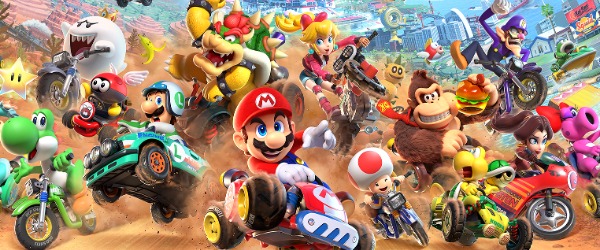
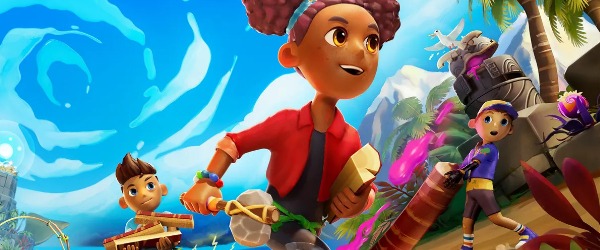
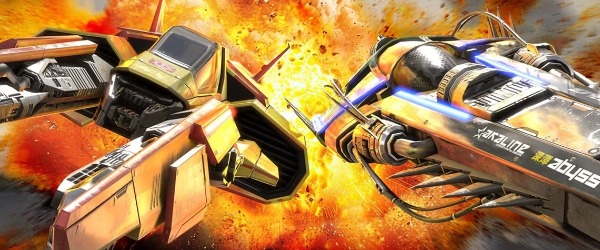
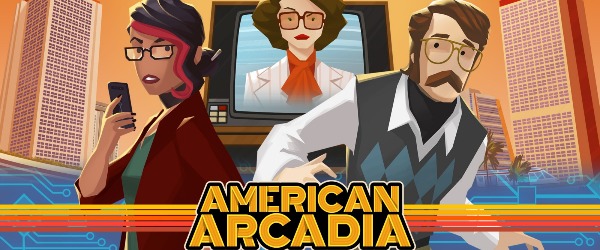












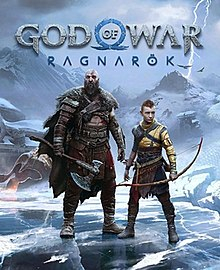



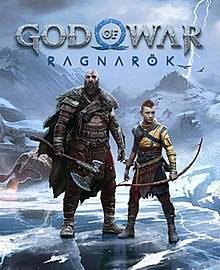

 Essay Pro
Essay Pro